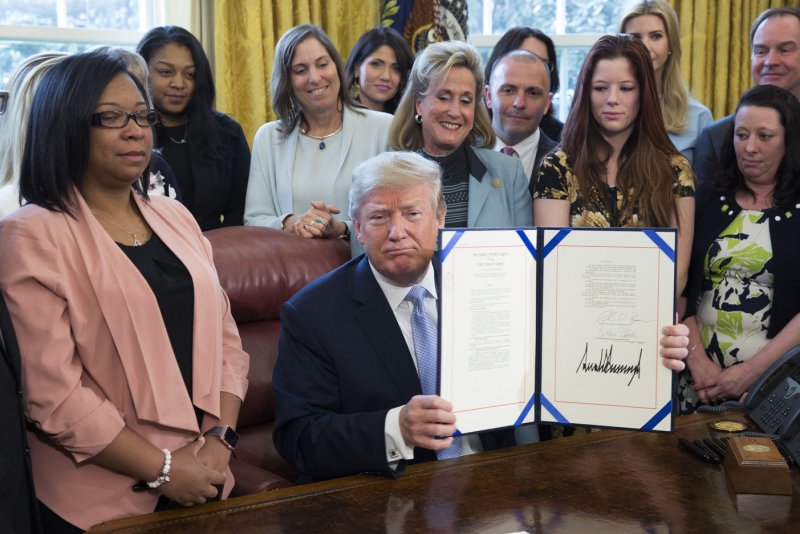President Donald Trump signs the Allow States and Victims to Fight Online Sex Trafficking Act of 2017 in the Oval Office of the White House on April 11. A digital advocacy group said this week it will mount a legal challenge to the law, saying it inflicts harm outside the sex trafficking industry. Photo by Chris Kleponis/UPI |
License Photo
June 29 (UPI) -- Digital rights campaigners said Friday they're challenging a U.S. law aimed at fighting online sex trafficking, saying it's too broad and has unintended consequences that undermine its purpose.
According to a blog post released Thursday by the Electronic Frontier Foundation, a nonprofit organization that champions user privacy, the Allow States and Victims to Fight Online Sex Trafficking Act of 2017 (FOSTA) was written so poorly that it hinders efforts to prosecute sex traffickers and aid victims.
The foundation is calling for the law to be declared unconstitutional to prevent it from being enforced.
"Although the law was passed by Congress for the worthy purpose of fighting sex trafficking, its broad language makes criminal[s] of those who advocate for and provide resources to adult, consensual sex workers and actually hinders efforts to prosecute sex traffickers and aid victims," EFE said.
During the months-long Congressional debate over the law, EFE voiced concerns the law would damage online freedoms. It ultimately passed and was signed into law by President Donald Trump in April.
"Congress was repeatedly warned that it was passing a law that would censor far more speech than was necessary to address the problem of sex trafficking," the foundation said.
The group said the law undermines protections for websites that host user-supplied content and "vastly magnifies" the risk the firms bear if they choose to run ads or forums dedicated to sexual professions.
Critics say the law limits the impact of organizations that advocate for sex workers. One, VerifyHim, logged descriptions of abusive clients to warn workers.
Internet sites like Craigslist and Reddit have since shut down forums and chat rooms that listed adult services, fearing prosecution.
The foundation's legal challenge is aided by the Internet Archive, Human Rights Watch and Woodhull Freedom Foundation and is backed by two individuals -- a spokesperson for sex workers and a masseur who now finds it difficult to advertise.















